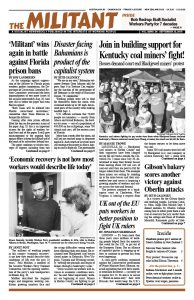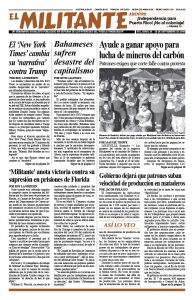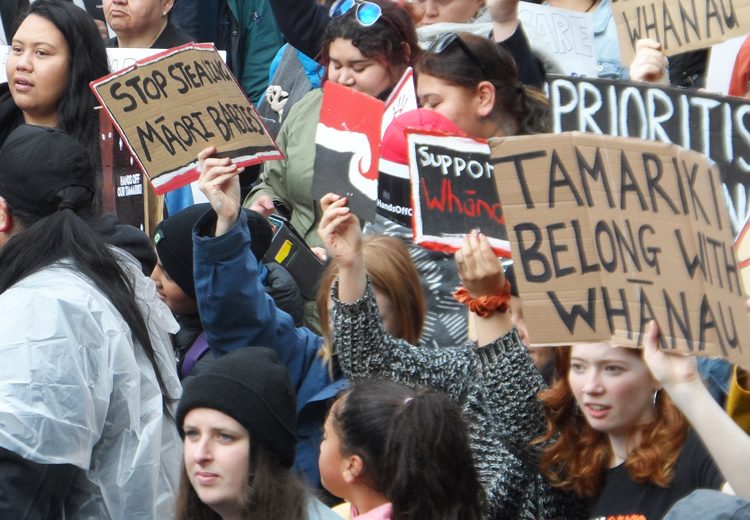WELLINGTON, New Zealand —Demanding “Hands Off Our Tamariki [children],” upwards of 400 people rallied at Parliament here July 30 to condemn the seizure of Maori children from their mothers by the children’s ministry, Oranga Tamariki. Protests took place in a number of other centers, including Christchurch Dunedin, and Tauranga.
Calls for the actions were sparked by media exposure of attempts by Oranga Tamariki representatives to seize a 7-day-old baby from a young mother at Hawkes Bay Hospital June 10-11. The Family Court had issued a without-notice custody order to take the baby into the state’s care.
A video on the Newsroom website showed the mother — supported by her family, partner and two midwives — holding off repeated attempts to snatch the baby. The mother’s family disputes claims made in the court order that they have a record of domestic violence and drug use.
The two midwives involved, Ripeka Ormsby and Jean Te Huia, were among the speakers at the Wellington rally protesting the seizure, or the “uplift,” of Maori children. “How is it possible that in our country, in this day and age, there’s no voice for the mother?” asked Ormsby.
The video touched a chord with many women who have had firsthand experience with Oranga Tamariki. Amid the furor, inquiries were launched and protests were organized outside Oranga Tamariki offices in many places around the country.
Rachael Taylor, a leader of the pickets in south Auckland, told the Militant July 15 that her daughter had been taken after coming to the attention of authorities for missing school. Accusing the family of having drug and alcohol problems, a social worker had secured a court order to remove the child. “It took a lot of effort to find out my rights and win my daughter back,” said Taylor.
“I’m angry at the intimidation tactics used on our ladies to prevent them from having hope or believing they are worth more,” Taylor wrote on the Destiny Church website.
From 2015 to 2018 the total number of babies under 3 months old removed from their parents jumped by over a third. This coincided with a new law decreeing that once a mother has one child removed she must then prove she is capable of taking care of any new baby or they will take that child.
The number of Maori babies “taken by the state” increased “from 110 in 2015 to 172 in 2018” says an open letter signed by almost 17,000 people and presented to members of Parliament at the Wellington protest.
In 2018, 62% of the 281 babies under 3 months old removed from their parents were Maori, reported a Radio New Zealand “Insight” documentary July 21. Of the nearly 5 million people in New Zealand, 16% are Maori, an oppressed nationality with a long and ongoing record of struggle for national rights.
Speaking at an Indigenous Nurses Aotearoa Conference organized by the New Zealand Nurses Organisation in Auckland, Aug. 9, Jean Te Huia pointed out that 86% of children in state care are Maori. She noted that parents seeking to reverse the seizure of their children are not entitled to legal aid, and so “have no financial means of defending themselves so they can get their children back.”
Annalucia Vermunt contributed to this article.


